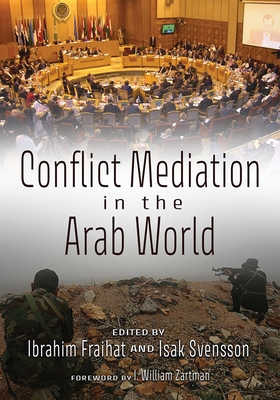

 Syracuse University Press
Syracuse University Press
Conflict Mediation in the Arab World


Key Metrics
- Ibrahim Fraihat
- Syracuse University Press
- Paperback
- 9780815638131
- -
- -
- Social Science > Ethnic Studies - Middle Eastern Studies
- English
 Secure Transaction
Secure TransactionBook Description
The Middle East and North Africa region has been plagued with civil wars, international interventions, and increasing militarization, making it one of the most war-affected areas in the world today. Despite numerous mediation processes and initiatives for conflict resolution, most have failed to transform conflicts from war to peace. Seeking to learn from these past efforts and apply new research, Fraihat and Svensson present the first comprehensive approach to mediation in the Arab world, taking on cases from Yemen to Sudan, from Qatar to Palestine, Syria, and beyond.
Conflict Mediation in the Arab World focuses on mediation at three different levels of analysis: between countries, between governments and armed actors inside single countries, and between different communities. In applying this holistic method, the editors identify similarities and differences in the conditions for conflict resolution and management.
Drawing upon the work of experts in the field with a deep understanding of the increasing complexities and changing dynamics of the region, this volume offers a valuable resource for academics, policy makers, and practitioners interested in conflict resolution and management in the Middle East and North Africa.
Author Bio
Dr. Ibrahim Fraihat is an associate professor in international conflict resolution at the Doha Institute for Graduate Studies, and non-resident fellow at Deakin University's Middle East Studies Forum in Australia. He previously served as senior foreign policy fellow at the Brookings Institution, and taught conflict resolution at Georgetown University and George Washington University. His latest book publications include: Iran and Saudi Arabia: Taming a Chaotic Conflict (Edinburgh University Press Feb. 2020), Unfinished Revolutions: Yemen, Libya, and Tunisia after the Arab Spring (Yale University Press, 2016).
Dr. Fraihat has published extensively on Middle East politics, with articles appearing in The New York Times, Foreign Affairs, Foreign Policy, Huffington Post, Al Jazeera websites, and elsewhere. Fraihat received a doctorate in conflict analysis and resolution from George Mason University in 2006. He is the recipient of George Mason University's Distinguished Alumni Award (2014) for his achievements in the field of conflict resolution. Dr. Fraihat was also awarded the Bronze Kondratieff Medal (2017) for "an outstanding contribution to the development of social sciences"
He consulted for international organizations on subjects of his research interest such as conflict resolution and post-conflict reconstruction in the Arab world, with a particular emphasis on conflict management and mediation, political transitions, national reconciliation, national dialogue, transitional justice, and institutional reform.
Research Interests
After the completion of a comparative study of the post-revolution transition processes in Yemen, Libya and Tunisia Dr. Fraihat is currently studying strategies of containment of the Arab-Iranian conflict and the mechanisms that could help prevent further escalation and better regulate the conflict development. The study assumes that an efficient management of the conflict should establish a foundation for more likely solutions in the future. Furthermore, the research examines the role of factors like sectarianism, nationalism, and geopolitics in Arab-Iran conflict escalation and attempts to identify alternative mechanisms that could help in de-escalation in the region especially in places like Syria, Yemen, and Iraq. ?
Source: Doha Institute for Graduate Studies
Videos




Community reviews
Write a ReviewNo Community reviews